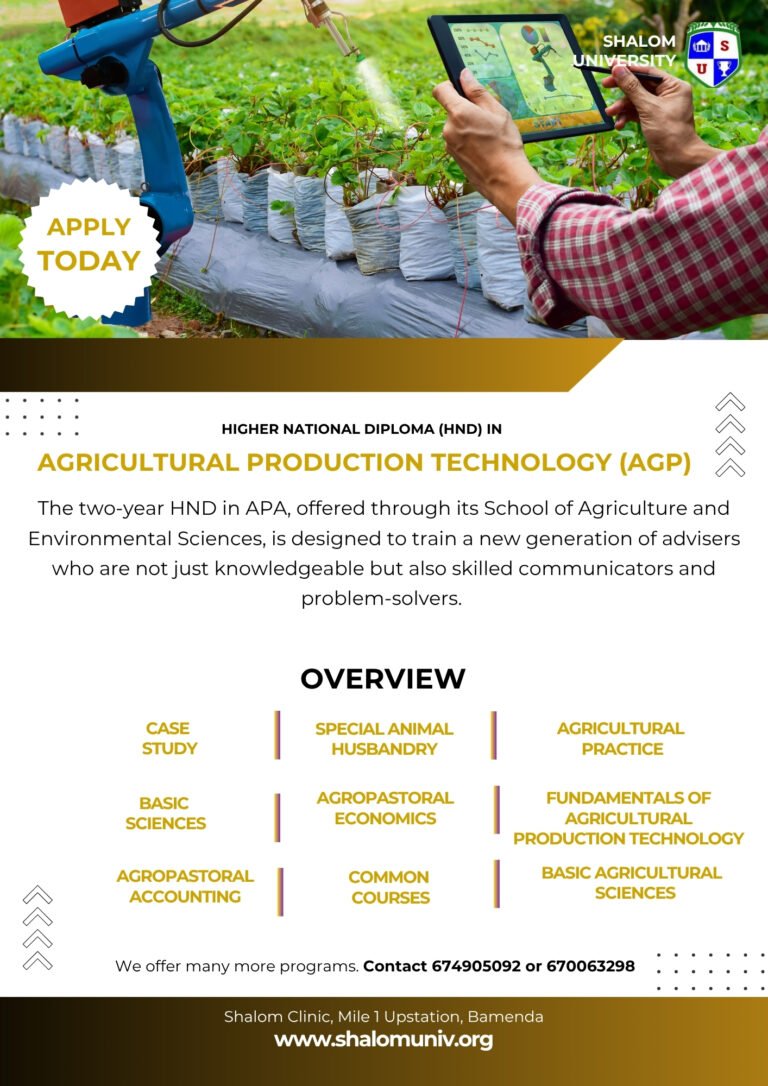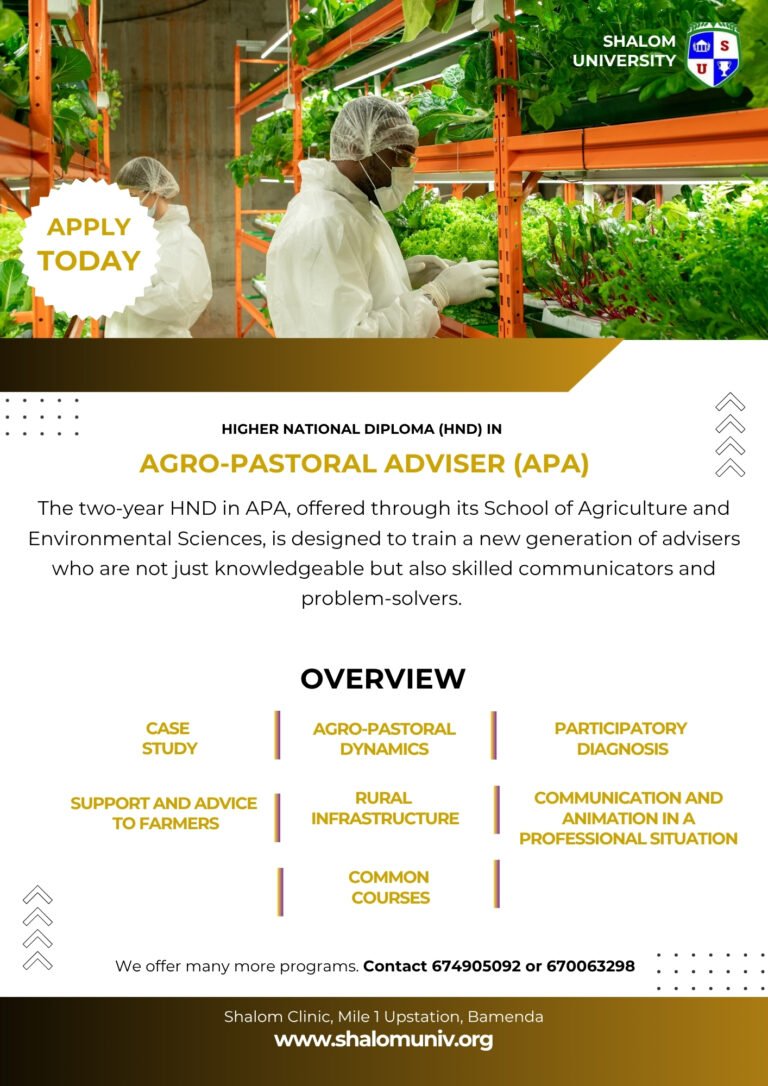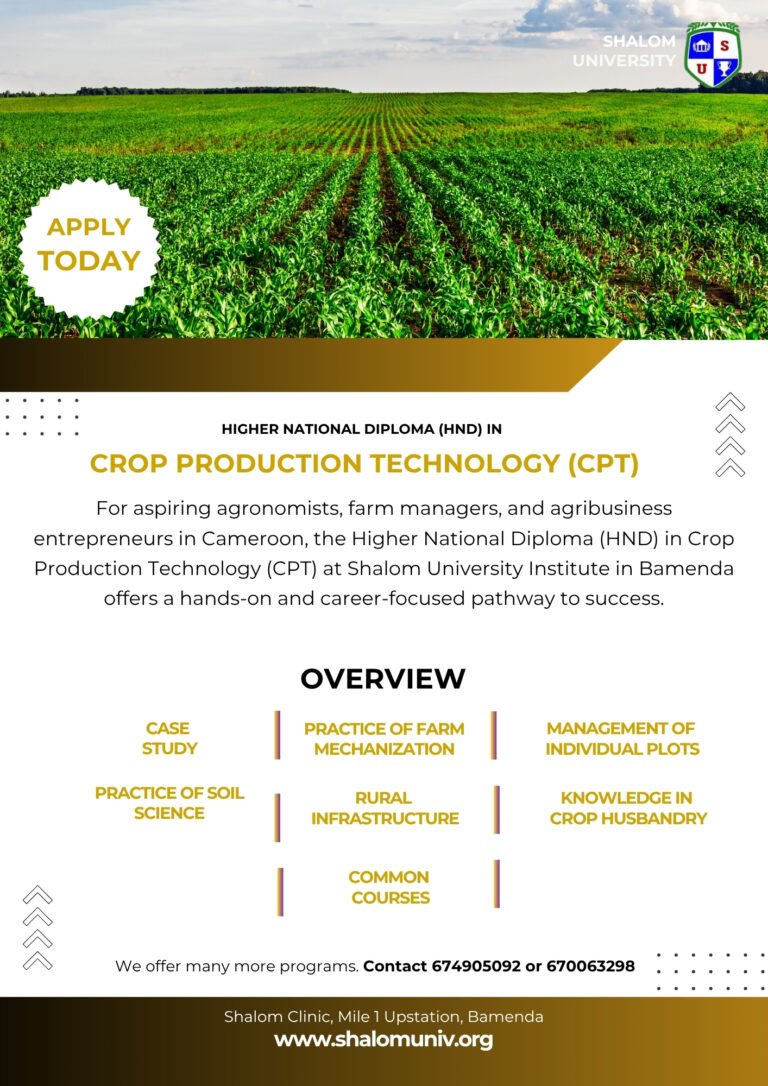In Cameroon, the food industry is a vital engine of economic growth, encompassing everything from small-scale agriculture to large-scale processing and manufacturing. As the nation seeks to enhance its food security, reduce post-harvest losses, and produce high-quality, value-added products for both local consumption and export, the demand for skilled food technologists is growing. The HND in Food Technology (FOT) at Shalom University in Bamenda is specifically designed to meet this demand, offering a practical and scientific program that prepares graduates to contribute to the innovation and excellence of Cameroon’s food sector.
The curriculum at Shalom University is tailored to the Cameroonian context, blending core food science principles with hands-on training in process design, transformation techniques, and quality management. Graduates are prepared not only to work in food processing facilities but also to drive entrepreneurial initiatives that add value to locally available raw materials, ultimately fostering agribusiness and creating employment.
The FOT Curriculum at Shalom University
The HND in Food Technology program at Shalom University is structured around a set of core papers that provide a comprehensive and practical education in the field.
Paper: Case Study
The Case Study paper is a vital component that integrates all the theoretical knowledge and technical skills gained throughout the program. It challenges students to analyze complex scenarios within the food processing industry, from developing a new product using locally sourced ingredients to addressing a contamination issue in a production facility. This is particularly relevant for food technologists in Cameroon, who must navigate local supply chains, market demands, and consumer preferences.
The course trains students to:
- Analyze real-world food production challenges: Based on a given case, students evaluate operational bottlenecks, quality control issues, or product development strategies faced by a food business in Cameroon.
- Identify critical issues and underlying causes: They pinpoint specific problems related to food safety, processing efficiency, or product quality and explore the underlying factors.
- Propose evidence-based solutions: Students formulate practical recommendations based on food science principles, processing techniques, and quality management standards. For example, a case study might involve analyzing a dairy company facing spoilage issues and proposing a new pasteurization process or a more effective cold chain management system.
- Defend their decisions: During formal presentations, students must justify their analysis and proposed solutions, demonstrating their critical thinking and communication skills, which are essential for effective management and stakeholder collaboration in the food industry.
Paper: Food Process Design
This paper focuses on the principles and practicalities of designing and optimizing food processing operations. It provides students with the engineering knowledge needed to create efficient, safe, and cost-effective production systems.
Key topics include:
- Processing Equipment: Understanding the function and operation of various food processing equipment, such as mixers, extruders, pasteurizers, and dryers.
- Plant Layout: Principles of designing efficient food processing plant layouts to optimize workflow, minimize cross-contamination, and ensure safety.
- Process Flow Diagrams: Creating and interpreting process flow diagrams to visualize and analyze food production processes.
- Energy and Resource Efficiency: Strategies for optimizing energy and water consumption in food processing operations, which is important for sustainability and cost reduction.
Paper: Food Processing
This paper provides students with a detailed understanding of the various techniques used to process food, from raw materials to finished products. It combines theoretical knowledge with hands-on practice in a lab or production environment.
The curriculum covers:
- Preservation Techniques: Various methods for extending the shelf life of food products, including thermal processing (canning, pasteurization), fermentation, and drying, which are vital for reducing post-harvest losses, particularly for perishable crops like fruits and vegetables.
- Transformation Techniques: Methods for transforming raw materials into value-added products, such as converting cassava into flour, processing plantains into chips, or producing fruit juices and jams.
- Packaging and Labeling: Designing and implementing appropriate packaging and labeling for food products, adhering to Cameroonian standards and international regulations.
- Scaling Up Production: Understanding the challenges and techniques involved in scaling up production from a small-scale, artisanal level to an industrial scale.
Paper: Food Science
Food Science applies scientific principles to the study of food, addressing issues related to food safety, quality, and preservation. This paper is crucial for ensuring that food products are safe for consumption, have a long shelf life, and maintain their quality.
Key topics include:
- Food Chemistry: The chemical composition of food and how it affects properties like texture, color, and flavor.
- Food Microbiology: The role of microorganisms in food spoilage and foodborne illnesses, and methods for controlling their growth.
- Food Safety and Hygiene: Understanding and implementing food safety standards and regulations, which are crucial for compliance with the National Agency for Norms and Quality (ANOR) in Cameroon.
- Nutritional Analysis: The process of analyzing the nutritional content of food products and understanding their impact on human health.
Paper: Food Transformation Techniques
This paper focuses on the specialized techniques used to transform specific food products, often using locally available ingredients. It builds on the general food processing paper to provide more in-depth, hands-on knowledge.
The curriculum addresses:
- Dairy Processing: Techniques for processing dairy products, such as milk, cheese, and yogurt, considering local production and consumption patterns.
- Meat and Fish Processing: Methods for processing and preserving meat and fish, including drying, smoking, and canning.
- Cereal and Legume Processing: Techniques for processing local grains and legumes into various food products, such as flour, fortified porridge, and snacks.
- Fruit and Vegetable Processing: Methods for processing local fruits and vegetables into juices, jams, purees, and dried products.
Paper: Food Quality Control and Management
This paper is crucial for ensuring that food products meet specified quality and safety standards. It provides students with the tools and methodologies needed to implement robust quality control systems.
Key areas of focus include:
- Quality Management Systems (QMS): Principles and implementation of internationally recognized QMS standards (e.g., ISO 22000 for food safety), crucial for Cameroonian companies aiming for international markets.
- Hazard Analysis and Critical Control Points (HACCP): Implementing HACCP principles to identify, evaluate, and control food safety hazards.
- Statistical Quality Control (SQC): Using statistical tools to monitor and control production processes, ensuring consistent quality.
- Auditing and Compliance: Conducting internal and external audits to assess compliance with quality standards and regulations.
- Traceability: Implementing traceability systems to track food products from production to consumption, ensuring accountability and food safety.
Innovating Cameroon’s Food Sector
Graduates of the HND in Food Technology from Shalom University are well-prepared to contribute significantly to Cameroon’s agro-industrial sector. They can find opportunities as food technologists, quality control officers, process engineers, or production supervisors in a variety of settings, including food manufacturing companies, breweries, and research institutions. Their proficiency in food science, process design, quality management, and transformation techniques, coupled with an understanding of the local context, makes them highly sought-after candidates. The Case Study paper ensures that they are not just technically skilled but also adept at applying their knowledge to solve real-world food production challenges. By providing a comprehensive and contextually relevant education, Shalom University plays a significant role in nurturing the expertise crucial for driving innovation, adding value to local produce, and ensuring food safety and security in Cameroon.




